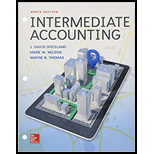
INTERMEDIATE ACCOUNTING(LL)-W/CONNECT
9th Edition
ISBN: 9781260216141
Author: SPICELAND
Publisher: MCG CUSTOM
expand_more
expand_more
format_list_bulleted
Concept explainers
Question
Chapter 17, Problem 17.3E
To determine
Pension expense: Pension expense is an expense to the employer paid as compensation after the completion of services performed by the employees.
Pension expense includes the following components:
- Service cost
- Interest cost
- Expected return on plan assets
- Amortization of prior service cost
- Amortization of net loss or net gain
To indicate: Whether each of the following events listed below increases, decreases, or has no effect on an employer’s periodic expense in the year the event occurs.
Expert Solution & Answer
Want to see the full answer?
Check out a sample textbook solution
Students have asked these similar questions
Calculate the net income general accounting consider the information
General accounting question
What is the budgeted manufacturing general accounting fixed overhead rate?
Chapter 17 Solutions
INTERMEDIATE ACCOUNTING(LL)-W/CONNECT
Ch. 17 - Prob. 17.1QCh. 17 - Prob. 17.2QCh. 17 - Prob. 17.3QCh. 17 - What is the vested benefit obligation?Ch. 17 - Prob. 17.5QCh. 17 - Prob. 17.6QCh. 17 - Name three events that might change the balance of...Ch. 17 - Prob. 17.8QCh. 17 - Prob. 17.9QCh. 17 - Prob. 17.10Q
Ch. 17 - The return on plan assets is the increase in plan...Ch. 17 - Define prior service cost. How is it reported in...Ch. 17 - Prob. 17.13QCh. 17 - Is a companys PBO reported in the balance sheet?...Ch. 17 - What two components of pension expense may be...Ch. 17 - Prob. 17.16QCh. 17 - Evaluate this statement: The excess of the actual...Ch. 17 - Prob. 17.18QCh. 17 - TFC Inc. revises its estimate of future salary...Ch. 17 - Prob. 17.20QCh. 17 - Prob. 17.21QCh. 17 - Prob. 17.22QCh. 17 - The components of postretirement benefit expense...Ch. 17 - The EPBO for Branch Industries at the end of 2018...Ch. 17 - Prob. 17.25QCh. 17 - Prob. 17.26QCh. 17 - Prob. 17.1BECh. 17 - Prob. 17.2BECh. 17 - Prob. 17.3BECh. 17 - Prob. 17.4BECh. 17 - Prob. 17.5BECh. 17 - Prob. 17.6BECh. 17 - Prob. 17.7BECh. 17 - Prob. 17.8BECh. 17 - Prob. 17.9BECh. 17 - Prob. 17.10BECh. 17 - Net gain LO176 The projected benefit obligation...Ch. 17 - Prob. 17.12BECh. 17 - Prob. 17.13BECh. 17 - Postretirement benefits; determine the APBO and...Ch. 17 - Prob. 17.15BECh. 17 - Prob. 17.1ECh. 17 - Prob. 17.2ECh. 17 - Prob. 17.3ECh. 17 - Prob. 17.4ECh. 17 - Prob. 17.5ECh. 17 - Prob. 17.6ECh. 17 - Prob. 17.7ECh. 17 - Prob. 17.8ECh. 17 - Prob. 17.9ECh. 17 - Prob. 17.10ECh. 17 - Prob. 17.11ECh. 17 - PBO calculations; ABO calculations; present value...Ch. 17 - Prob. 17.13ECh. 17 - Prob. 17.14ECh. 17 - Prob. 17.15ECh. 17 - Prob. 17.16ECh. 17 - Prob. 17.17ECh. 17 - Prob. 17.18ECh. 17 - Prob. 17.19ECh. 17 - Prob. 17.20ECh. 17 - Prob. 17.21ECh. 17 - Prob. 17.22ECh. 17 - Prob. 17.23ECh. 17 - Prob. 17.24ECh. 17 - Prob. 17.25ECh. 17 - Prob. 17.26ECh. 17 - Prob. 17.27ECh. 17 - Prob. 17.28ECh. 17 - Prob. 17.29ECh. 17 - Prob. 17.30ECh. 17 - Prob. 17.31ECh. 17 - Prob. 17.32ECh. 17 - Prob. 17.33ECh. 17 - Prob. 17.1PCh. 17 - PBO calculations; present value concepts LO173...Ch. 17 - Service cost, interest, and PBO calculations;...Ch. 17 - Prob. 17.4PCh. 17 - Prob. 17.5PCh. 17 - Prob. 17.6PCh. 17 - Determining the amortization of net gain LO176...Ch. 17 - Prob. 17.8PCh. 17 - Prob. 17.9PCh. 17 - Prob. 17.10PCh. 17 - Prob. 17.11PCh. 17 - Prob. 17.12PCh. 17 - Prob. 17.13PCh. 17 - Prob. 17.14PCh. 17 - Prob. 17.15PCh. 17 - Prob. 17.16PCh. 17 - Prob. 17.17PCh. 17 - Prob. 17.18PCh. 17 - Prob. 17.19PCh. 17 - Prob. 17.20PCh. 17 - Prob. 17.21PCh. 17 - Prob. 17.1BYPCh. 17 - Prob. 17.2BYPCh. 17 - Prob. 17.3BYPCh. 17 - Prob. 17.5BYPCh. 17 - Prob. 17.6BYPCh. 17 - Prob. 17.7BYPCh. 17 - Prob. 17.8BYPCh. 17 - Prob. 17.9BYPCh. 17 - Prob. 17.11BYPCh. 17 - Prob. 1CCTCCh. 17 - Prob. 1CCIFRS
Knowledge Booster
Learn more about
Need a deep-dive on the concept behind this application? Look no further. Learn more about this topic, accounting and related others by exploring similar questions and additional content below.Similar questions
- MoonWear, Inc. offers an unconditional return policy. It normally expects 2.5% of sales at retail selling prices to be returned before the return period expires. Assuming that MoonWear records total sales of $12.5 million for the current period, what amount of net sales should it record for this period?arrow_forwardHi expert please given correct answer with accountingarrow_forwardHelp with accounting questionarrow_forward
arrow_back_ios
SEE MORE QUESTIONS
arrow_forward_ios
Recommended textbooks for you
 Intermediate Accounting: Reporting And AnalysisAccountingISBN:9781337788281Author:James M. Wahlen, Jefferson P. Jones, Donald PagachPublisher:Cengage Learning
Intermediate Accounting: Reporting And AnalysisAccountingISBN:9781337788281Author:James M. Wahlen, Jefferson P. Jones, Donald PagachPublisher:Cengage Learning

Intermediate Accounting: Reporting And Analysis
Accounting
ISBN:9781337788281
Author:James M. Wahlen, Jefferson P. Jones, Donald Pagach
Publisher:Cengage Learning
